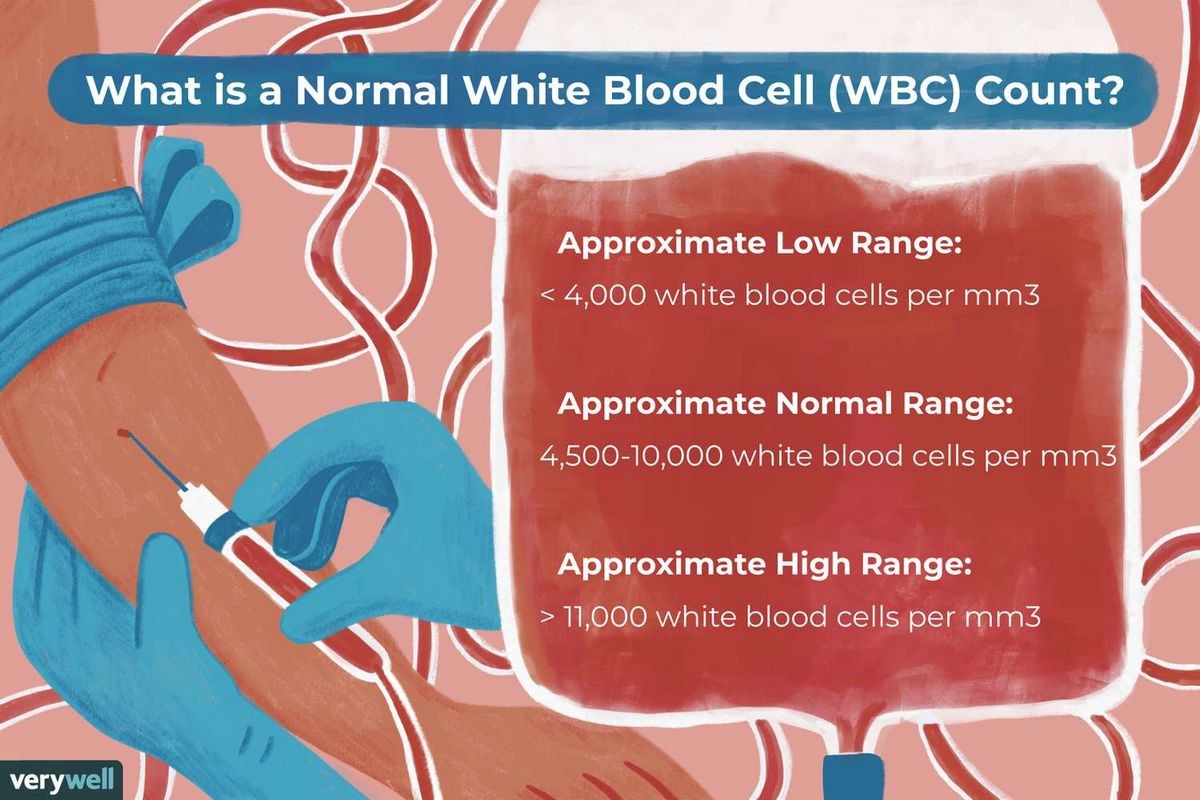
Contents
- 1 Why Is My White Blood Cell Count High?
- 1.0.1 Signs of a High White Blood Cell Count
- 1.0.2 Causes of a High White Blood Cell Count
- 1.0.3 When to See the Doctor for a High White Blood Cell Count
- 1.0.4 Diagnosis of a High White Blood Cell Count
- 1.0.5 Treatments for a High White Blood Cell Count
- 1.0.6 What Are the Symptoms of a Low White Blood Cell Count?
- 1.0.7 What Causes a Low White Blood Cell Count?
Why Is My White Blood Cell Count High?
White blood cells, also known as leukocytes, are one of the four components of blood. They can rise for various reasons including stress, smoking, allergies, infections, and certain drugs.
White blood cells, or leukocytes, are a crucial part of blood, making up just 1% of the total volume. However, their significance should not be underestimated. These cells play a vital role in the immune system, fighting off infections and diseases. Therefore, maintaining an adequate white blood cell count is essential.
Your white blood cell count (WBC) measures the number of these cells in your body. A low count indicates a weaker immune system, making you more susceptible to bacteria, viruses, and diseases.
A high white blood cell count, known as leukocytosis, can be concerning and may have various causes, such as preexisting infections or other factors.
Signs of a High White Blood Cell Count
A high WBC count may correct itself in some cases, like when your body produces more white blood cells during an infection to defend against bacteria or viruses.
However, additional treatment may be necessary to lower a high white blood cell count. Understanding the causes and potential symptoms of increased WBC count is crucial for effective treatment.
The signs of a high white blood cell count can vary, and sometimes there may be no symptoms at all. This is because any symptoms experienced are typically a result of the underlying cause of the elevated count.
If you have leukocytosis, a medical condition characterized by a high WBC count, you may experience symptoms such as:
- Fever
- Bleeding or bruising
- Feeling faint, dizzy, or sweaty
- Feeling tired, weak, or sick
- Trouble breathing, seeing, or thinking
- Pain or tingling in your limbs or abdomen
- Unexplained weight loss or poor appetite
Causes of a High White Blood Cell Count
A high white blood cell count can have various causes, often being a reaction to other processes in your body or an underlying disease. Here are some common causes:
- Stress
- Smoking
- Allergies
- Bacterial or viral infections
- Certain drugs, like corticosteroids and epinephrine
When to See the Doctor for a High White Blood Cell Count
A high white blood cell count is usually not unexpected, and you may already have signs or knowledge of an existing condition that could contribute to the high count. It is essential to consult with a doctor if you experience any of the following symptoms:
Diagnosis of a High White Blood Cell Count
Your doctor will need to perform a white blood cell count test to determine if your WBC count is elevated. This test measures the number of white blood cells per microliter of blood.
A normal WBC range is typically between 4,500 and 11,000 cells per microliter. Counts exceeding 11,000 cells per microliter are considered high.
Once you receive your test results, your doctor will collaborate with you to create an appropriate treatment plan, if necessary. They may also recommend additional tests to gain a better understanding of your condition.
Treatments for a High White Blood Cell Count
Treatment for a high white blood cell count depends on its underlying cause. In some cases, no treatment may be necessary. Here are some common treatments for conditions associated with a high WBC count:
- Antihistamines or inhalers for allergies
- Antibiotics for bacterial infections
- Adjustments to medication in the case of a drug reaction
- Treatment for inflammatory conditions
- Treatment for anxiety and stress
If you are diagnosed with leukocytosis, your doctor may recommend a procedure called leukapheresis. This procedure uses a machine to separate and remove white blood cells from your blood, effectively reducing your WBC count.
What Are the Symptoms of a Low White Blood Cell Count?
White blood cells are essential for fighting off infections in the body. When the white blood cell count is low, the body’s ability to deal with infections is compromised.
A low white blood cell count, known as leukopenia, is usually identified through a routine blood test called a complete blood count (CBC) performed during illness or general health checkups.
Leukopenia may not cause noticeable signs and symptoms in many cases. However, if symptoms occur, they may include:
Fever (temperature higher than 100.5°F)
It is important to note that not all cases of fever, chills, and sweating are associated with a low white blood cell count. Thus, further testing and follow-up with a doctor are recommended to monitor white blood cell levels and identify the underlying cause of leukopenia.
What Causes a Low White Blood Cell Count?
Various conditions can lead to a low white blood cell count. These include:
Infectious conditions (most common):
- Viral infections
- Tuberculosis
- Human immunodeficiency virus (HIV) or acquired immunodeficiency syndrome (AIDS)
Disorders of the bone marrow:
Conditions affecting the bone marrow can decrease white blood cell production, resulting in a low count. These conditions include:
- Aplastic anemia
- Exposure to certain chemicals
- Chemotherapy
- Radiation
- Bone marrow transplant
Rare bone marrow conditions that can cause a low white blood cell count include:
- Myelodysplastic syndromes
- Myeloproliferative syndrome
- Myelofibrosis
Autoimmune disorders:
Some autoimmune disorders can lead to a low white blood cell count as the immune system fails to differentiate between foreign infections and the body’s own cells.
Problems with the spleen:
Inflammation of the spleen due to infections or blood clots can decrease white blood cell count. Additionally, an overactive spleen can remove both damaged and healthy blood cells, resulting in a lowered count.
Medicines:
- Metronidazole
- Wellbutrin (bupropion)
- Clozaril (clozapine)
- Sodium valproate
- Steroids
- Lamictal (lamotrigine)
- Interferons
- Minocin (minocycline)
- Sandimmune (cyclosporine)
- Cellcept (mycophenolate mofetil)
- Penicillin
- Rapamune (sirolimus)
- Prograf (tacrolimus)
Arsenic poisoning can also cause leucopenia in some cases.
Vitamin deficiencies:
Poor nutrition and deficiencies in vitamins such as B12, folic acid/folate, copper, and zinc can lead to a low white blood cell count. Alcohol abuse can also contribute to decreased white blood cell count due to interference with vitamin metabolism.
References:
American Family Physician: "Evaluation of Patients with Leukocytosis."
Cancer Research UK: "Treatment to remove abnormal white blood cells (leukapheresis)."
Cleveland Clinic: "High White Blood Cell Count."
Lab Tests Online: "White Blood Cell Count (WBC)."
Mayo Clinic: "High white blood cell count."
Mayo Clinic: "Low blood cell counts: Side effect of cancer treatment."
Mayo Clinic: "Low white blood cell count."
Leukemia & Lymphoma Society: "Understanding Blood Counts."
Middlesex Health: "High white blood cell count."


